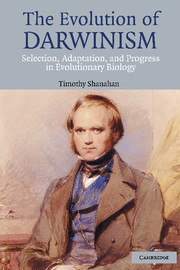Book contents
- Frontmatter
- Contents
- Introduction
- I SELECTION
- II ADAPTATION
- III PROGRESS
- 7 Darwin on Evolutionary Progress
- 8 Evolutionary Progress from Darwin to Dawkins
- 9 Is Evolution Progressive?
- 10 Human Physical and Mental Evolution
- Epilogue
- Appendix: What Did Darwin Really Believe About Evolutionary Progress?
- Notes
- References
- Index
8 - Evolutionary Progress from Darwin to Dawkins
Published online by Cambridge University Press: 18 December 2009
- Frontmatter
- Contents
- Introduction
- I SELECTION
- II ADAPTATION
- III PROGRESS
- 7 Darwin on Evolutionary Progress
- 8 Evolutionary Progress from Darwin to Dawkins
- 9 Is Evolution Progressive?
- 10 Human Physical and Mental Evolution
- Epilogue
- Appendix: What Did Darwin Really Believe About Evolutionary Progress?
- Notes
- References
- Index
Summary
Evolutionary biologists, it seems, can neither live with nor live without the idea of progress.
(Greene 1990, p. 55)Introduction
Darwin viewed the evolutionary process as contingently but nonetheless significantly progressive. Under the influence of natural selection organisms become not only better adapted to their conditions of life, but also tend to become more complex and specialized – more improved, in a sense. The synthesis of Darwin's ideas with Mendelian genetics in the first half of the twentieth century resolved many of the problems that led some biologists immediately after Darwin to embrace non-Darwinian evolutionary theories. Ironically, such developments also exacerbated the problems posed for the idea of evolutionary progress. If evolution simply consists of shifts in gene frequencies resulting from selection operating on randomly generated mutations in fluctuating environments, in what sense could the evolutionary process as a whole be considered “progressive”? Different biologists responded to this problem in different ways. The result was a sustained controversy over the meaning and reality of evolutionary progress, the terms of which continue to inform contemporary debates on this issue.
In considering the controversy over evolutionary progress in the twentieth century, I will focus on two debates that serve to highlight the critical biological and philosophical issues involved. The first occurred in the middle decades of the twentieth century and pitted against one another two of the most prominent evolutionists of the day.
Information
- Type
- Chapter
- Information
- The Evolution of DarwinismSelection, Adaptation and Progress in Evolutionary Biology, pp. 196 - 219Publisher: Cambridge University PressPrint publication year: 2004
